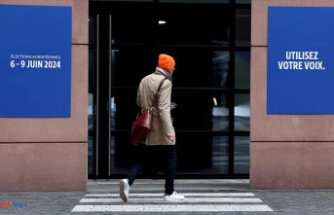24 hours a day, the cameras installed in the rooms of the intensive care unit watch over the patients of Covid-19. Two patients have died since the outbreak began.
Xosé Bouzas pour L'Express
Most patients are "curarized": their muscles are paralyzed by this drug to prevent them from contracting. And let the respirator do its job.
Xosé Bouzas pour L'Express
Caregivers, like nurses, are not enough. "It breaks our hearts not to be able to accept more patients, but we cannot do better, for lack of staff", laments Fabrice Daviaud, intensive care doctor.
Xosé Bouzas pour L'Express
The victims of Covid-19, fragile as glass, require a lot of attention. It takes six to seven people to place a patient in "ventral decubitus" - on his stomach, a position that facilitates oxygenation.
Xosé Bouzas pour L'Express
All holidays have been cancelled. The nurses are on duty for 12 hours, four days in a row, before enjoying a day off. The least experienced, under the guidance of experienced colleagues.
Xosé Bouzas pour L'Express
Electric syringe pumps, essential for the continuous distribution of drugs, are becoming rare. From now on, two products, hitherto administered separately, will be mixed in a device.
Xosé Bouzas pour L'Express
Dr. Julien Nahum, cardiologist (here, on the left), and his colleagues chain the guards at a hellish pace. Up to 30 hours straight, sometimes.
Xosé Bouzas pour L'Express
As in all hospitals in Ile-de-France, the medicines essential to patients placed under artificial respiration are likely to be lacking – curares such as hypnotics and analgesics.
Xosé Bouzas pour L'Express
The state of health of this 67-year-old retired doctor, a volunteer in a center for disabled adults, has deteriorated for 24 hours. He is intubated as soon as he arrives at the clinic.
Xosé Bouzas pour L'Express
Before intubating the patient, intern Mélanie Saint Jouan and doctor Julien Nahum must insert two catheters, one in the radial vein, the other in the femoral artery.
Xosé Bouzas pour L'Express
Mélanie Saint Jouan, intern in anesthesia resuscitation, was to end her internship at the beginning of May. She will stay longer, soon supported by a second intern.
Xosé Bouzas pour L'Express












